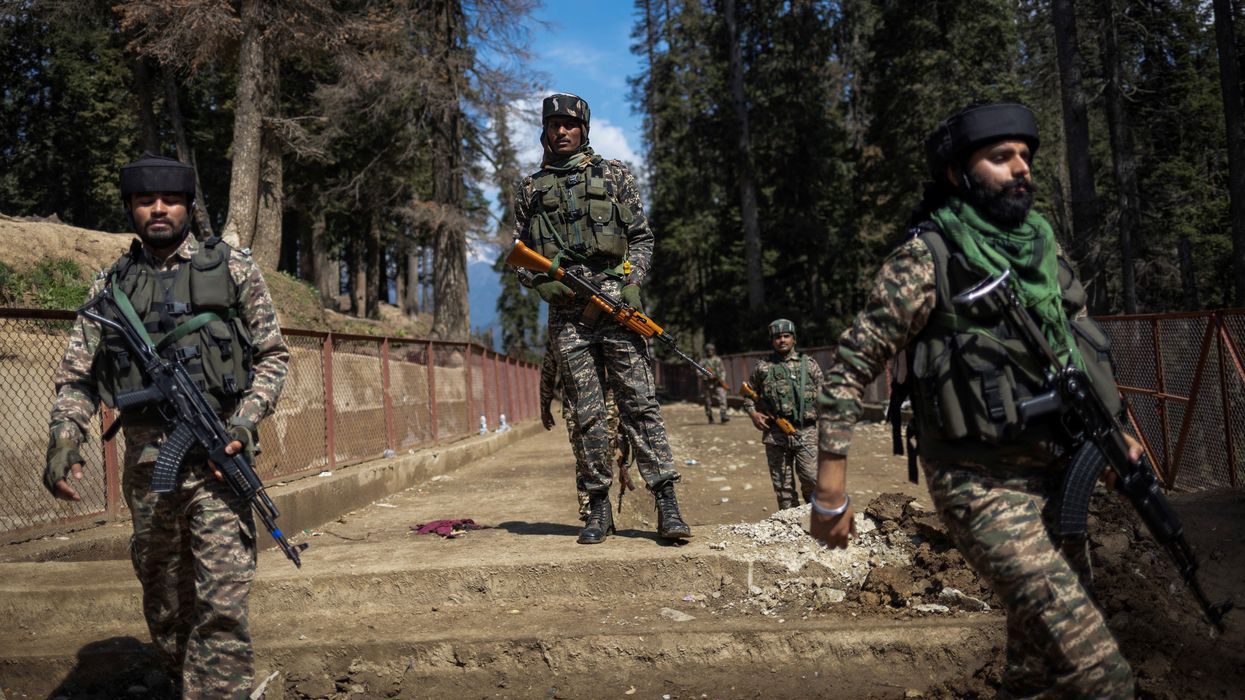INDIAN and Pakistani troops exchanged fire overnight along the Line of Control in Kashmir, officials from both sides said on Friday.
The exchange took place days after a deadly attack in the region and amid calls from the United Nations for both countries to show "maximum restraint".
Syed Ashfaq Gilani, a government official in Pakistan-administered Kashmir, told AFP that the firing took place along the Line of Control (LoC) but said, "There was no firing on the civilian population."
India’s army confirmed the incident and said there had been limited small arms fire, which it claimed was “initiated by Pakistan” and was “effectively responded to”.
The UN had earlier urged both countries to resolve their differences peacefully. “We very much appeal to both the governments... to exercise maximum restraint, and to ensure that the situation and the developments we've seen do not deteriorate any further,” UN spokesman Stephane Dujarric said in New York on Thursday. He added that issues “can be and should be resolved peacefully through meaningful mutual engagement.”
Tensions between India and Pakistan have escalated following the killing of 26 civilians at a tourist site in Pahalgam, Indian-administered Kashmir. Indian police have identified two of the three fugitive gunmen as Pakistani nationals.
Prime minister Narendra Modi, in his first address since Tuesday’s attack, said, “I say to the whole world: India will identify, track and punish every terrorist and their backer. We will pursue them to the ends of the Earth.”
Pakistan has denied involvement in the attack. A statement issued after a National Security Committee meeting chaired by prime minister Shehbaz Sharif said, “Any threat to Pakistan’s sovereignty and to the security of its people will be met with firm reciprocal measures in all domains.” Islamabad also described attempts to link Pakistan to the Pahalgam attack as “frivolous”.
India has suspended a water-sharing treaty, closed its main land border crossing with Pakistan, downgraded diplomatic ties, and withdrawn visas for Pakistani nationals. The steps were taken a day after the attack.
In response, Pakistan on Thursday expelled Indian diplomats and military advisers, cancelled visas for Indian nationals — except for Sikh pilgrims — and closed the border crossing from its side. It also warned that any attempt by India to block the supply of water from the Indus River would be seen as an “act of war”.
Indian police say the gunmen are members of the Pakistan-based Lashkar-e-Taiba, a UN-designated terrorist organisation. A bounty of two million rupees ($23,500) has been announced for information leading to the arrest of each attacker.
India’s air force and navy carried out military exercises on Thursday.
Kashmir has been divided between India and Pakistan since 1947, with both countries claiming the territory in full but controlling separate parts. Rebel groups have been active in Indian-administered Kashmir since 1989, seeking either independence or a merger with Pakistan.
The attack in Pahalgam marked a change from past assaults, which typically targeted Indian security forces.
Tuesday’s shooting occurred as tourists visited the site, when gunmen opened fire with automatic weapons. Survivors told Indian media that the attackers targeted men and spared those who could recite the Islamic declaration of faith.
Indian security forces have launched a manhunt for the attackers and detained a large number of people.
Hindu nationalist groups have expressed anger over the incident, and Kashmiri students in other parts of India have reported cases of harassment and intimidation.
In 2019, a suicide bombing killed 41 Indian troops in Pulwama and led to Indian air strikes inside Pakistan.
“Whatever little land these terrorists have, it's time to reduce it to dust,” Modi said on Thursday, after observing two minutes of silence for the victims.
(With inputs from agencies)





